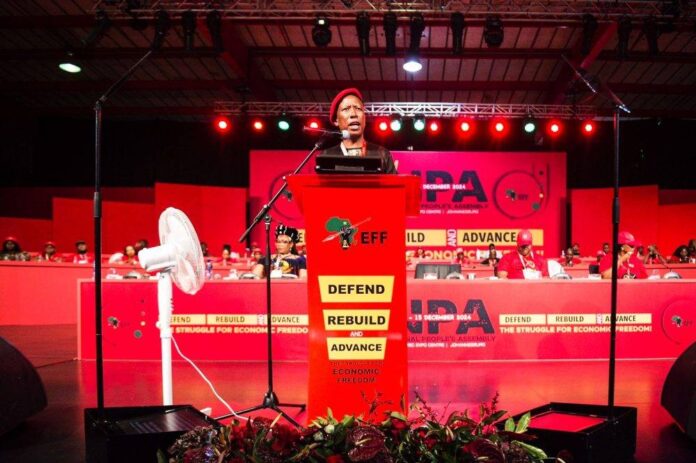The Economic Freedom Fighters (EFF) concluded its national conference in Nasrec, Johannesburg, with its leadership boasting of a smoothly run event. However, the elephant in the room, or rather, the conspicuously absent elephant, was Mbuyiseni Ndlozi, whose unexplained absence dominated conversations amongst delegates and fuelled intense speculation across mainstream and social media.
Ndlozi's name echoed through the halls, a stark reminder of the divisions simmering beneath the surface of the party's carefully constructed image of unity.
Reports from Friday suggested attempts by delegates from Gauteng, the Free State, and the Eastern Cape to raise concerns about Ndlozi's absence were swiftly quashed by members of the central command team (CCT). Insiders revealed that some EFF members even attempted to push for Ndlozi's nomination for a top position, but these efforts were ultimately unsuccessful. The tension surrounding Ndlozi's situation was palpable, a stark contrast to the party's public pronouncements of a seamless conference.
This decision, it was reported, had created a significant rift within the organisation. The red berets, however, maintained a stony silence, refusing to offer any explanation for Ndlozi's absence at crucial CCT and national executive committee meetings – meetings he, as a member, should have attended.
The questions surrounding Ndlozi's absence finally came to a head when, following persistent inquiries from delegates and the media, EFF leader Julius Malema erupted in a Saturday morning outburst. He declared that the party would not be defined by a single individual and that the conference would proceed regardless of Ndlozi's absence.
"He isn’t here. I heard people saying that he was and that he was [causing this commotion], but he’s not here. It’s not in our interests to entertain such nonsense," Malema stated.
Malema's initial attempts at diplomacy regarding Ndlozi's situation had clearly eroded. His frustration mounted as he accused journalists of failing to focus on the extensive political report he had presented the previous day.
"So, as a matter of principle and policy position, we’re no longer going to answer any nonsense about Mbuyiseni Ndlozi. Never! This matter’s closed!" he declared, adding that he would instruct the entire leadership to follow suit.
The absence of Ndlozi, however, has not gone unnoticed within the EFF. It has caused significant friction, particularly amongst younger members who had hoped to see him considered for a leadership role. This possibility now seems remote, given reports of growing tension between Ndlozi and Malema. The reported fallout stems from allegations that Ndlozi was aware of former deputy president Floyd Shivambu's decision to join the Mkhonto weSizwe Party (MKP) but failed to inform the EFF leadership. Malema further implied that Ndlozi had failed to adequately defend the party during periods of "attack".
EFF secretary-general Marshall Dlamini echoed Malema's sentiments on Friday, stating that Ndlozi had not contacted the party regarding his availability for a leadership position in the third NPA. "We won’t reduce our conference to an individual," Dlamini emphasised. "We’re here now at the third NPA. This NPA will prove that no one’s bigger than this organisation," he added, firmly shutting down any further discussion on the matter.
Despite the controversy surrounding Ndlozi's absence, the NPA proceeded. Delegates deliberated on the political and organisational reports presented by Malema and Dlamini on Friday, and the election of new leadership was expected. City Press understands that Malema is anticipated to be re-elected unopposed as president for a third term, with Godrich Gardee as deputy president, Dlamini retaining his position as secretary-general, Leigh-Ann Mathys becoming deputy secretary-general, and Noluthando Tshungu elected national chairperson, replacing Veronica Mente. Omphile Maotwe is also expected to retain her position as treasurer-general.
Dlamini reported a 90% turnout of voting delegates, describing it as a testament to the party's organisational strength. Of the 2 243 expected voting delegates, 2 026 were present on Friday. The remaining delegates were accounted for, with absences attributed to personal reasons such as funerals and traditional ceremonies, particularly in the Eastern Cape. Dlamini highlighted the significance of the turnout, stating that achieving even 65% attendance is typically considered successful. The 90% attendance, he argued, demonstrated the dedication of the EFF's branches, regions, and provinces.
However, delegates from KwaZulu-Natal and the Western Cape were unable to participate in the voting process due to their branches failing to meet the 10% electoral support threshold in the May 2024 provincial elections. Despite this, these delegates remained involved in the assembly's discussions.
Malema also used the opportunity to criticise the MKP, led by former president Jacob Zuma, dismissing it as lacking genuine progressive credentials. While the two parties are partners in Parliament's progressive caucus, Malema stressed that true progressiveness requires adherence to Marxist-Leninist principles and a commitment to black consciousness. He described the progressive caucus as a pragmatic alliance rather than an ideological one.
The conference comes at a critical juncture for the EFF, which has faced setbacks in recent times, including a decline in national support, a drop in its parliamentary ranking, and the loss of several senior members to the MKP.











